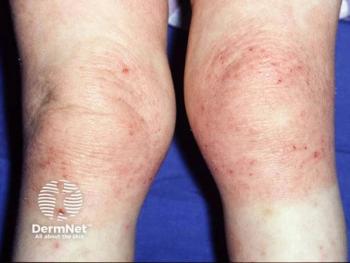
Biologic lebrikizumab effective for atopic dermatitis
The high-affinity interleukin 13 inhibitor lebrikizumab significantly improved atopic dermatitis manifestations and symptoms with a safety profile similar to placebo, according to results from a phase 2b randomized clinical trial.
The high-affinity interleukin 13 (IL-13) inhibitor lebrikizumab (Dermira) significantly improved atopic dermatitis manifestations and symptoms with a safety profile similar to placebo, according to
The data support IL-13’s pivotal role in atopic dermatitis pathophysiology, according to the study published February 26 in JAMA Dermatology.
Lebrikizumab is different than dupilumab, which is approved to treat atopic dermatitis, according to the study’s lead investigator Emma Guttman-Yassky, M.D., Ph.D., professor and vice chair of dermatology at the Icahn School of Medicine at Mount Sinai.
“Dupilumab targets the IL-4 receptor alfa and because it targets the receptor, it targets both IL-4 and IL-13,” Dr. Guttman-Yassky says. “Lebrikizumab targets only one of these cytokines, IL-13. Thus, it’s even more targeted than dupilumab because it’s targeting a single cytokine.”
This phase 2 study with lebrikizumab for atopic dermatitis, while it is not a head-to-head study, suggests that its efficacy may be in dupilumab’s ballpark, according to Dr. Guttman-Yassky.
In this 16-week trial, researchers studied 280 moderate-to-severe atopic dermatitis patients, mean age 39.3 years. They studied three doses, including 125 mg every 4 weeks with a 250 mg loading dose; 250 mg every four weeks; or 250 mg every two weeks, compared to placebo.
“…lebrikizumab showed rapid, dose-dependent efficacy across a broad range of key [atopic dermatitis] clinical manifestations, including skin lesions, pruritus, and quality of life, in adult patients with moderate-to-severe [atopic dermatitis] not previously controlled by standard topical therapies,” the authors wrote.
Patients experienced itch relief on day two of treatment, according to the paper.
If phase 3 research goes well, it could be that patients on lebrikizumab might only need injections once a month. But that needs to be determined from phase 3 data, according to Dr. Guttman-Yassky.
“It may be possible, after an induction to give the drug every four weeks. That may be an important factor for patients that seek fewer injections,” she says.
Theoretically, a more targeted drug like lebrikizumab might result in fewer side effects than more broad treatments. In this study for example, researchers noted less than 3% of patients had conjunctivitis compared to none in the placebo group. But that too might change in phase 3 trials. Conjunctivitis as an adverse event didn’t occur with any significance until phase 3 studies with dupilumab, she says.
Having another biologic option to treat atopic dermatitis is important, according to Dr. Guttman-Yassky.
“Biologics are generally safe. We can use them to treat patients for the long term. We have cyclosporin, but cyclosporin is an immune suppressant that we cannot use in patients long term,” she says. “Because of the mechanism of action, many biologics do not necessitate frequent bloodwork and monitoring, they don’t interact with other drugs and so on.”
Lebrikizumab is being evaluated in two phase 3 studies, ADvocate 1 and ADvocate 2, looking at the drug’s safety and efficacy in patients ages 12 years and older with moderate-to-severe atopic dermatitis. Dermira received the FDA’s Fast Track designation for lebrikizumab for treatment of atopic dermatitis in December last year.
In addition to continuing studies on lebrikizumab, Dr. Guttman-Yassky’s lab is spearheading research on how to use biologics as personalized medicine for treatment of atopic dermatitis.
“We defined multiple phenotypes for atopic dermatitis. I do think that in the future we may be able to treat patients in a personalized way to see if they need a single antibody or maybe something more broad,” she says.
Disclosures:
Dermira funded the study and had input in the study, including in the interpretation of data.
Dr Guttman-Yassky has received research grants paid to Icahn School of Medicine from AbbVie, Almirall, Amgen, AnaptysBio, Asana Biosciences, Boehringer-Ingelheim, Celgene, Dermavant, DS Biopharma, Eli Lilly, Galderma, Glenmark, Innovaderm, Janssen Pharmaceuticals, Kiniksa, Kyowa Kirin, LEO Pharma, Novan, Pfizer, Ralexar, Regeneron, Sienna Biopharma, UCB, and Union Therapeutics. She serves as a consultant for AbbVie, Almirall, Amgen, Asana BioSciences, Boehringer-Ingelheim, Cara Therapeutics, Celgene, Concert, DBV, Dermira, DS Biopharma, Eli Lilly, EMD Serono, Escalier, Galderma, Glenmark, Kyowa Kirin, LEO Pharma, Mitsubishi Tanabe, Pfizer, RAPT Therapeutics, Regeneron, Sanofi, Sienna Biopharma, and Union Therapeutics.
References:
Guttman-Yassky E, Blauvelt A, Eichenfield LF, Paller AS, Armstrong AW, Drew J, Gopalan R, Simpson EL. Efficacy and Safety of Lebrikizumab, a High-Affinity Interleukin 13 Inhibitor, in Adults With Moderate to Severe Atopic Dermatitis: A Phase 2b Randomized Clinical Trial. JAMA Dermatol. 2020 Feb 26. doi: 10.1001/jamadermatol.2020.0079.
Newsletter
Like what you’re reading? Subscribe to Dermatology Times for weekly updates on therapies, innovations, and real-world practice tips.











